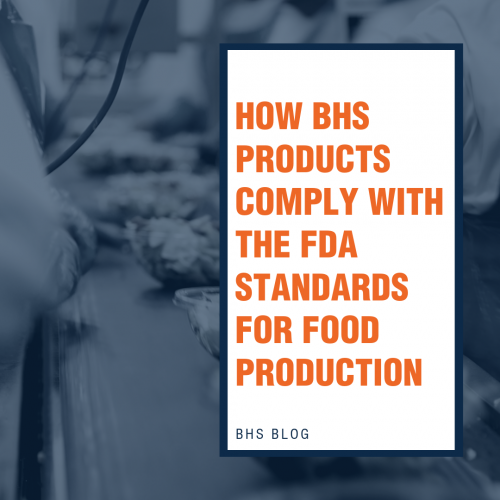We use cookies to make your experience better. To comply with the new e-Privacy directive, we need to ask for your consent to set the cookies. Learn more.
How BHS Products Comply with the FDA Standards for Food Production
The FDA Food Code provides recommendations to state, local, territorial, and tribal governments on food-safety standards. While it is up to individual governments whether to write the Food Code recommendations into local law, the Food Code does represent a unifying authority on safety in food production, handling, transportation, and service.
So when you’re designing material handling equipment for the food production industry, as BHS, Inc. does, the Food Code presents clear, attainable benchmarks that are likely to meet or exceed requirements in every jurisdiction. That makes the FDA Food Code a great resource for BHS engineers. 
So how exactly does BHS, Inc. manufacture equipment that complies with Food Code recommendations? The answer basically boils down to material and design: Stainless steel construction and an avoidance of hard-to-reach seams and cracks usually complies with the FDA Food Code, no matter what sort of equipment you’re working with.
Here are the top relevant FDA Food Code requirements for food-contact surfaces, along with the manufacturing choices BHS puts in place to ensure compliance:
- 4-101.11 Characteristics. Materials that are used in the construction of UTENSILS and FOOD-CONTACT SURFACES of EQUIPMENT may not allow the migration of deleterious substances or impart colors, odors, or tastes to FOOD and under normal use conditions shall be: (A) Safe; (B) Durable, CORROSION-RESISTANT, and nonabsorbent; (C) Sufficient in weight and thickness to withstand repeated WAREWASHING; (D) Finished to have a SMOOTH, EASILY CLEANABLE surface; and (E) Resistant to pitting, chipping, crazing, scratching, scoring, distortion, and decomposition.
Stainless Food Service Bins from BHS clearly meet these requirements, and most BHS Material Handling Equipment is available with a custom stainless steel finish that also comply with the FDA Food Code 2017 Subpart 4-101.11.
- 4-202.11 Food-Contact Surfaces. (A) Multiuse FOOD-CONTACT SURFACES shall be: (1) SMOOTH; (2) Free of breaks, open seams, cracks, chips, inclusions, pits, and similar imperfections; (3) Free of sharp internal angles, corners, and crevices; (4) Finished to have SMOOTH welds and joints; and (5) Except as specified in ¶ (B) of this section, accessible for cleaning and inspection by one of the following methods: (a) Without being disassembled, (b) By disassembling without the use of tools, or (c) By easy disassembling with the use of handheld tools commonly available to maintenance and cleaning personnel such as screwdrivers, pliers, open-end wrenches, and Allen Wrenches. (B) Subparagraph (A)(5) of this section does not apply to cooking oil storage tanks, distribution lines for cooking oils, or BEVERAGE syrup lines or tubes.
Even nonfood-contact surfaces must be clean and “free of unnecessary ledges, projects, and crevices,” in order to make them easy to sterilize, according to the Food Code Subpart 4-202.16.
Material Handling Equipment from BHS, including Stainless Food Service Bins and several models of Bin Dumpers, is designed for cleanliness and sterilization. Other products — such as Lift Tables, Tilt Tables, and Material Carts, are all available in stainless steel on request.
Clean design and stainless steel construction ensure that BHS products built for food production applications comply with the FDA Food Code 2017, making them likely to also comply with state and local food regulations. For more information on custom material handling equipment in stainless steel, call the BHS sales team at 1.800.BHS.9500.
References:
“Food Code 2017.” FDA. U.S. Food and Drug Administration, 2017. PDF. 19 Sept. 2019.
